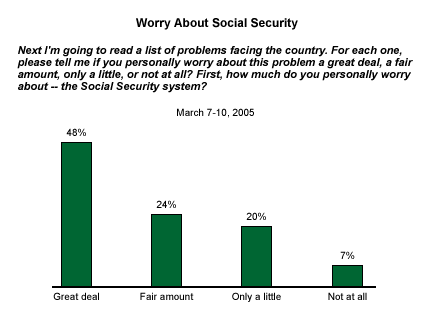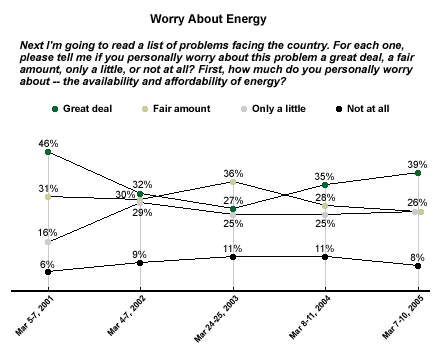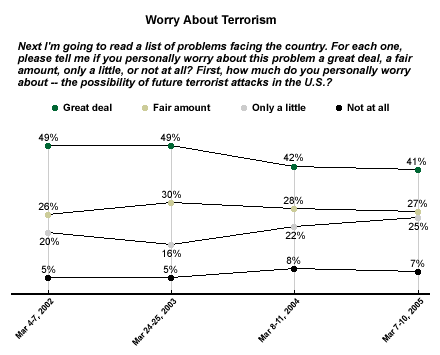Since March 2001, Gallup has annually asked Americans to rate their personal level of worry with a number of social, economic, and political issues in the United States. The "Social Security system," which was included on the list of issues for the first time this year*, debuted among the top concerns. Of the 12 items Gallup tested, only "the availability and affordability of healthcare" is a larger concern for the public than Social Security. Roughly half (48%) of Americans worry a "great deal" about Social Security and another 24% worry a "fair amount." Slightly more than a quarter (27%) worry about the issue "only a little" or "not at all."

Because this is the first year Social Security was included in the survey, it is unclear whether the Bush administration's current initiative to reform Social Security through private investment accounts has elevated Americans' level of concern with that issue. However, Americans are much more likely now than in the past to cite Social Security as the most important problem facing the country.
Demographically, Americans nearing retirement are most likely to say they worry a great deal about Social Security. Forty-four percent of 18- to 29- year-olds say they worry about Social Security a great deal, as do 49% of 30- to 49-year-olds. More than half (54%) of 50- to 64-year-olds worry a great deal, compared with 43% of those aged 65 and older -- many of whom are probably already collecting Social Security.
Worry about Social Security is also directly related to household income. Americans with higher incomes -- who are less likely to depend on Social Security for retirement income -- are also less likely than other Americans to say they worry about it a great deal. Thirty-seven percent of those with annual household incomes of $75,000 or more worry a great deal about the Social Security system, compared with 62% of Americans earning $30,000 a year or less.
Energy Anxiety
How does concern about Social Security compare with concerns about other political "hot button" issues of the day?
With gas prices topping $2 per gallon across the country, Americans are feeling the pinch. Although fewer Americans are worried about "the availability and affordability of energy" than they are about Social Security, concern about energy is up. Nearly 4 in 10 Americans (39%) worry a great deal about energy supplies, up 4 percentage points from March 2004, and up 12 points from March 2003. However, the level of worry about energy today is still lower than it was in March 2001, when 46% of Americans worried a great deal about energy availability.

It is possible that energy concerns have risen since the poll was conducted in early March, especially since the price of oil has reached record highs.
Terrorism Less Troubling?
The possibility of a terrorist attack still troubles many Americans, but not to the degree it did in 2002 and 2003. Forty-one percent of Americans say they worry a great deal about the possibility of a terrorist attack in the United States -- about the same percentage that worry a great deal about the availability and affordability of energy. The percentage worried about terrorism is in line with the percentage from last year (42%), but significantly lower than the 49% who worried a great deal about a terrorist attack in 2002 and 2003.

Bottom Line
Public awareness and worry about different issues will ebb and flow along with current events. Today's oil prices are causing worry about energy to trend upward. When it comes to terrorism, the fact that no attacks have occurred since 2001 has allowed the public's level of concern to remain fairly static. Whether the current battle over Social Security reform will lead to increased or decreased worry about that issue may depend on its outcome -- namely, whether Bush can muster enough support in Congress for reform.
*These results are based on telephone interviews with a randomly selected national sample of 1,008 adults, aged 18 and older, conducted March 7-10, 2005. For results based on this sample, one can say with 95% confidence that the maximum error attributable to sampling and other random effects is ±3 percentage points. In addition to sampling error, question wording and practical difficulties in conducting surveys can introduce error or bias into the findings of public opinion polls.
